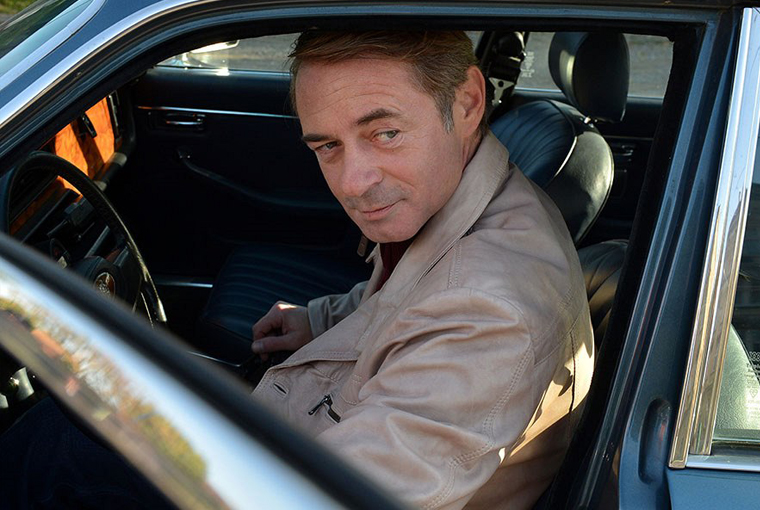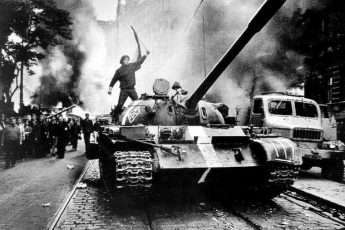
The motor of Jiří Strach’s Osmy is, to put it in terms intuitively deployed yet characteristically enriched by Milan Kundera in his debut novel, a joke. (While the title of Kundera’s novel has been translated as The Joke, suggesting singularity, this is merely due to the limited ability of the English language to have nouns in the singular stand on their own; in Czech, no recourse to articles is necessary so that the title simply reads “Žert” and thus steers readers clear of tying it to the prominent, practical joke of the novel that becomes fatal for one of its protagonists – jokes, in Kundera’s universe, come in many shapes and sizes, and are as much a metaphor for a time as for its lack of humor.) The joke of Strach’s film is that a man signs the Charta 77 – the founding document of Czechoslovakia’s post-68 dissident movement – inadvertently while drunk. An act (if one can call it one) our protagonist can barely recall nor even justify before himself, the signing seems harmless – funny even. But “things conceived in error”, as one of Kundera’s character learns with great distress, and so jokes, “are just as real as things conceived with good reason and of necessity”, and it is before long that Strach’s protagonist, too, is confronted with this realization that we must normally only deal with during our youth.
Strach tries to present his protagonist Richard (Ivan Trojan), family man and accountant, as being perfectly normal. He has a wife and mistress, is moderately ambitious, scared of having his wisdom teeth pulled (which lends the film its title) and indulges, as was already hinted at, in the occasional drinking bout. The “normality” that Strach constructs is thus one modeled on that of the contemporary middle class. This is laudable insofar as it shows that people in 1970s Czechoslovakia, too, were made of flesh and blood, that they had their petty fears and ambitions, wisdom teeth and affairs. But it is also dangerous in that Strach risks carrying our contemporary views and historical myths into that time. After all, the “normalization” that the authorities enforced and which lent the whole period its name, was conceived along Marxis-Leninist lines, and it would flatter the Czech’s easily affronted, national pride to grant them an ignorance of and resilience towards that state-authorized conception of normality.
This is a tension already reflected in Richard’s lapsarian act. Strach makes it blatantly obvious that Richard – initially at least – perceives his undesigned signing as a curse. There is no hint of either pride or contentment, no awareness of the pompous glory with which the Charta 77 would eventually be viewed upon. Instead, there is bitterness and despair as Richard realizes that it is easier to sign the document than it is to revoke one’s support, and that his career and life will inevitably suffer a grave blow. (This is not to say that it was quite as easy to sign the Charta 77 as Strach suggests, who has Richard literally stagger into the arms of a dissident who has the document spread out in front of him right in a pub, nor that one had no way of revoking one’s signature – nevermind the residual repercussions – as some did in fact publicly denounce their signing to save their skin.) At the same time, Richard’s joke is met with an absurd degree of support. Just about every woman around him – including the secretary of the state department’s boss where Richard is employed – thanks him for signing the document, with one attractive co-worker even taking it as a pretense to leave her husband and follow up on an affair she shared with Richard. This is not only renewed proof of the patriarchal taint of Czech men’s phantasies, but is also one of the two ways in which Karel Gott is thrust aside, who is not only stripped of his sex symbol status by an aging, gray accountant, but is not even allowed to deliver the tune of the time, which honor is instead granted to Jiří Schelinger, a much more progressive and rocky musician whose popularity never came close to that of Gott.
Strach’s selective memory reflects an obvious concern for adapting the 1970s to the tastes of his audience, which is somehow served Jaguars, the Zeppelins and Marlboro cigarettes. There is a tension between such attempts at modernizing the normalization period and the parallel suggestion that these were times of utter despair, which Strach tries to resolve by having his DP Vladimír Křepelka banish all colorfulness off the screen, and by catapulting Richard into increasingly grotesque situations. Thus, Richard’s existence is not only threatened by his political predicament, but likewise by the mistress who wants to marry him, the wife who wants to leave him, or the 15-year-old-son who made his girlfriend pregnant. The film’s running gag are the sewage pipes in Richard’s apartment which need repairing, but which won’t be dealt with by the country’s notoriously lazy handymen. In a climactic scene which brings all these problems together, the pipes blow, forcing Richard and his family to stomp through the sewage juices filling their apartment. The normalization period, it is suggested, was so unbearable nothing but humor could make it barely watchable.
There is thus none of the hidden, scathing humor of fate that Kundera unearths through his protagonists’ soliloquies. Jokes in Strach’s film function as cheap laughs which help us deal with the unbearable grimness of the 1970s. Perhaps as much is to be expected in a film commissioned by Czech TV. A director operating within the dictates of broadcasting bureaucracy is unlikely to even aspire to answer to such depths which pervade the pages of a good novel. Yet there is something revealing, and dangerous, about the lightheartedness of Strach’s approach. The true risk of Osmy is not its tone, but its message. For the comedic outcome of Osmy is not that the joke can be corrected and that even the Communist system offers a form of political, if not moral, redemption. It is that Richard’s being swamped by his troubles makes him immune to the dictates of political authority, that his being crushed and threatened with political, social and personal repercussions turns him into a hero. Though the pendulum keeps swinging against Richard, the survival of his challenges – in particular, of the title-lending pulling of his wisdom teeth – brings him to the realization (which, as in many TV products, is explicitly stated) that “fear hurts us most”, and that he shouldn’t give in to the blackmailing of the secret service but fight for his dignity. Which is all fair and good, if it weren’t for the fact that Richard didn’t even identify with the Charta 77 signees prior to his overcoming his fear. Is Strach saying that fear doesn’t only stop us from fighting for our ideals, but also keeps us from finding out what they are? Or is he saying that deep down, all Czechs were supporters of the Charta who were simply too scared to sign? In the end, much is distorted in this universe where people don’t fight for their ideals in spite of their fears, but thanks to them. Which is only striking if one overlooks the fact that Strach found the only possible way of reinterpreting Czech post-68 complicity with the system as an act of heroism.




Leave a Comment